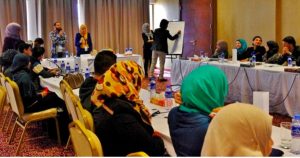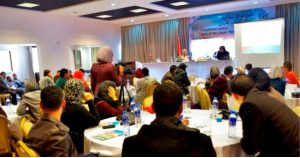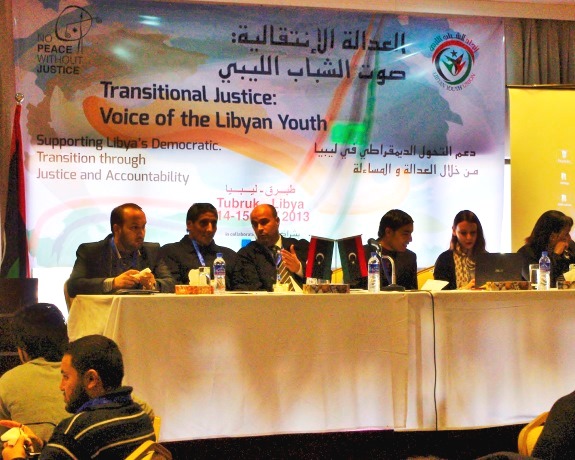On 14-15 December 2013, the Libyan Youth Union (LYU) organised a Transitional Justice Outreach Initiative in Tobruk, a coastal town situated approximately 1,500km east of Tripoli. No Peace Without Justice (NPWJ) supported and contributed to the event in the framework of its Transitional Justice Program in Libya, which aims to empower local civil society on transitional justice issues.
The two-day event held in Tobruk was part of the Youth Day Program on Transitional Justice, which foresees the organisation of several events across Libya. LYU and NPWJ organised the first Youth Day event in Tripoli in March 2013 and will organise the following two in Sirte and Sebha. The aim of the Youth Day Program is to engage Libya’s youth in the transitional justice process by raising awareness about different experiences of transitional justice around the world and encouraging young Libyans across the country to participate and support their country’s transition to democracy, accountability and the rule of law. Fifty young activists from Tobruk and the surrounding area participated in this second Youth Day event.

On the first day, participants were introduced to key transitional justice concepts and mechanisms. Speakers from Libya and abroad gave examples of transitional justice experiences in other countries, emphasising the importance of such processes in democratic transition and as a path to achieving accountability and reconciliation. They explained the current transitional justice process in Libya and highlighted the important role of the youth and civil society organisations in supporting and participating in this process. Participants were keen to voice their opinions and hear more about the transitional justice experiences of other countries in order to understand what lessons can be learnt and applied to Libya.
The second day was based on a role-play exercise that aimed at encouraging participants to consider different viewpoints in a post-conflict society and how these reflect on the understanding, perception and implementation of transitional justice mechanisms. Participants divided into groups representing different stakeholders in a fictional post-conflict country and discussed and decided upon a transitional justice strategy to which all parties could agree and which could be implemented in practice. This exercise allowed the young participants to consider firsthand the multiple challenges and benefits of transitional justice. It also demonstrated the important role they, as young activists, can play in creating the conditions for accountability, redress and reconciliation to be achieved in Libya.

NPWJ in Libya
NPWJ has been working on the Libyan transition since early 2011, in the framework of its project to support Libya’s democratic transition through justice and accountability. As the country embarks on legislative reforms, the Libyan authorities can break with the legacy of impunity and abuses that typified Gaddafi’s rule with a new respect for the rule of law and a commitment to restoring justice and dignity to victims. Doing so requires not only the investigation and prosecution of the crimes and violence perpetrated during the revolution, but also efforts to confront a history of oppression and human rights abuses that dates back decades under the rule of the former regime.
For further information on the activities of NPWJ in Libya please contact Stefano Moschini, Libya Program Coordinator, at smoschini@npwj.org or +218917450375.




